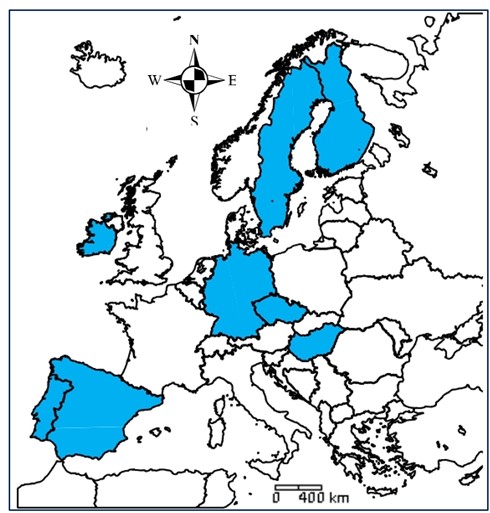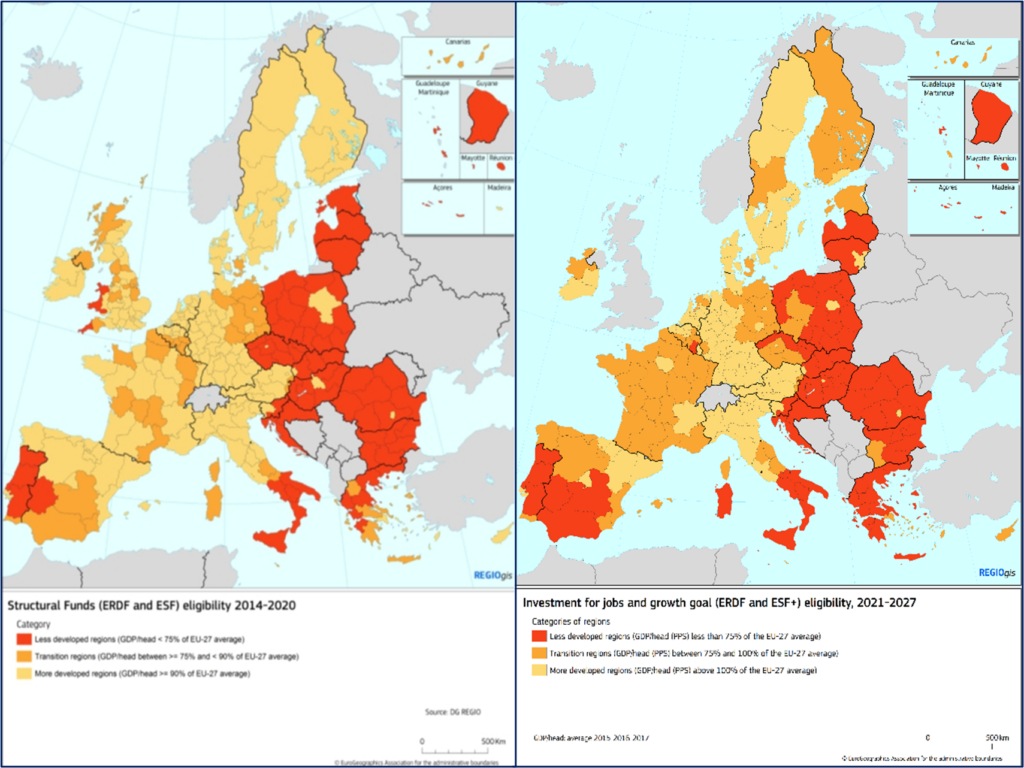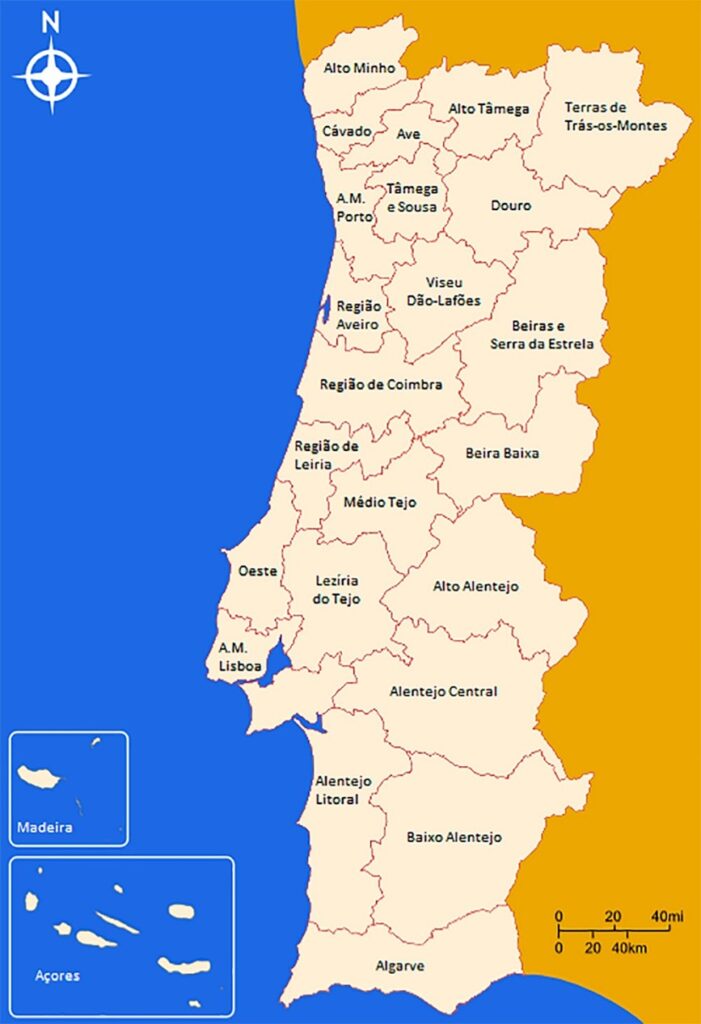By Eduardo Medeiros (email), Instituto Politécnico de Setúbal, ESTBarreiro, Rua Américo da Silva Marinho, 2839-001 Lavradio, Portugal and Instituto Universitário de Lisboa (ISCTE-IUL), DINÂMIA’CET – IUL, Lisboa, Portugal – Avenida das Forças Armadas, Edifício Sedas Nunes, Sala 2W4-d, 1649 – 026 Lisboa, Portugal.
Introduction
In several countries, the EU Cohesion Policy (ECP) serves as the primary source of policy investment for regional development and cohesion, especially in what is known as Cohesion Countries, encompassing the group of less socioeconomic developed European Union countries. Hence, considering the development needs of several EU regions, it is crucial to implement ECP as effectively and efficiently as possible in the context of limited funding. Following our 20 years of experience in assessing the impacts of ECP, performing a project appraisal of the selected ECP projects is critical and practical. This guarantees that the common interest is regarded and that ECP funding addresses strategic development needs appropriately.
In this context, this short paper introduces the main goals of an ongoing project financed by a MeRSA Grant 2023 entitled Effective Project Appraisal and Regional Development. In essence, this project aims to investigate the project appraisal process of ECP in several EU member-states, covering all parts of Europe (South: Portugal and Spain; North: Finland and Denmark; West: Germany and Ireland; and East: Czechia and Hungary). The proposed research aims to unveil and compare the ‘administrative/institutional criteria’ used for selecting ECP-implemented projects and the ‘who’ (entity, political party, etc.) interfering in that selection. Ultimately, the project proposes to find potential co-relation causes for ‘regional development trends’ and the ‘project appraisal of ECP process’.
This research is important and timely for European citizens, policymakers, practitioners, project developers, and academia. Firstly, the research aims to provide updated and useful data on how ECP-financed projects are selected in several EU Member States. Ultimately, this information intends to inform policymakers of the potential regional development gains from implementing more effective ECP project selection frameworks. With this, citizens and regions would benefit by increasing ECP efficiency levels. Secondly, the research intends to robust the academic debate on project selection processes as a key element for improving positive regional development and territorial cohesion processes. Crucially, an appropriate selection of financed ECP projects should (i) consider main regional development needs (relevance to regional sensibility); (ii) serve common interests (the inhabitant’s main needs) instead of private agendas; (iii) encompass a medium-long term, place-based and sustainable development rationale, which can effectively exploit the territorial capital of the region (smart specialization); (iv) promote all sorts of territorial cooperation and multi-level governance processes; and (v) places for development which serve as regional development engines (medium-cities).
By aiming at investigating the potential benefits of a sound and effective ECP project selection for regional development, the predicate of the research lies both in indicating potential roadmaps of more effective ways for ECP project selection and in compiling an inventory of potential best practices in ECP project selection frameworks, across Europe. In this context, the proposed research aims to promote knowledge exchange between policymakers, practitioners, and academic researchers and to grow networks and alliances interested in a more effective and efficient ECP implementation process towards regional development and territorial cohesion. Firstly, the research will benefit practitioners and policymakers by highlighting good practices and policy responses towards increasing project selection effectiveness. Secondly, producing new scientific evidence to inform EU, national, and regional entities of best practices in project selection, intends to instigate further academic debates on this scientific arena. Finally, interested stakeholders (regions, economic activities, and citizens) will benefit from a more efficient ECP implementation supporting more relevant projects given regional development needs. Alongside this, the research intends to stimulate deeper and more consequential involvement in project selection via co-production processes, upstream multi-stakeholder debates, or mechanisms for citizen deliberation and engagement.
Methodology
The research will follow direct and indirect methods to collect the necessary information for all case studies. For the most part, the project will be based on collected information via interviews with the entities responsible for selecting and managing ECP projects and will focus on a few European Member States; Portugal, Spain, Finland, Denmark, Germany, Ireland, Czechia, and Hungary (Figure 1). In all, the research methods will cover:
- Literature review: consultation of ECP strategies for all case studies. Literature revision (books, papers, reports) analysing the implementation of ECP in the analysed countries and regions.
- Field Research: Field trips to one or two selected case studies for direct contact with entities designing and implementing ECP strategies. Here, the prime case study will be conducted in Portugal.
- Semi-structured interviews: Face-to-face and/or telephone interviews/questionnaires with entities managing the implementation of ECP.
Figure 1. Research case-studies. Own elaboration.

The following two main questions will support the interview:
A – Please briefly present what is the project selection criteria and identify which entity/actors were involved in this decision?
B – Based on Table 1, please identify which body(s) has/have the final decision on the project selection, and which other body(s) are involved in the process and at which stage?
Table 1. List of potential entities involved in the project selection of ECP programmes/actions

The relevance of EU Cohesion Policy to regional development
Over the past decades, there have been countless scientific analyses on the relevance and impacts of ECP in fostering regional development and cohesion (Medeiros, 2017; Molle, 2007). While some authors present a more critical lens of ECP results and impacts, most of the existing analyses present a somewhat cautiously optimistic perspective of its implementation across the EU (Fratesi & Wishlade, 2017; Gagliardi & Percoco, 2017; Medeiros & van der Zwet, 2020; Polverari et al., 2022; Reitel et al., 2018). Whatever the case, as expected, some regions/Member States made better use of available ECP funding than others. Here, the recently (early 2024) published 9th Cohesion Report dedicates a whole section to present the main impacts of ECP, which can be summarised as follows (EC 2024):
- All EU regions benefited from ECP.
- ECP has promoted convergence and harmonious development.
- ECP has contributed to economic competitiveness, environmental sustainability, and social cohesion.
- ECP has contributed to mitigating the negative impacts of the COVID-19 pandemic.
- ECP has contributed to promoting socioeconomic development, especially in less-developed regions.
- ECP has contributed to fostering institutional capacity.
- ECP has contributed to speeding up reforms.
There is little doubt that ECP has positively impacted most of the mentioned policy domains, such as environmental sustainability. In this policy domain, however, more detailed research points to the need to improve the effectiveness and efficiency of available ECP funding (Polverari, 2016) towards fostering environmental sustainability, like in the Portuguese case (Medeiros et al., 2022; Medeiros & Valente, 2023). In this regard, despite all the efforts from the European Commission (EC) to increase control, audit, and financial accountability of ECP budget via stipulating shared responsibility with the Member States (Davies & Polverari. 2011) and more rigorous target-setting and conditionalities (Mendez, 2013), EU control mechanisms remain weak (Blom-hansen, 2005). This is especially true when it comes to selecting financed ECP projects.
In simple terms, regional development is a process that entails positive development trends of regions in key dimensions of territorial development which include economic competitiveness, environmental sustainability, social cohesion, territorial governance, and spatial planning (Medeiros, 2019). To assess the ECP distribution across EU regions, however, an economic criterion (Gross Domestic Product – GDP) is often used to divide these regions into different groups, one being the less socioeconomically developed regions of the EU, formerly known as ECP objective 1 regions. Here, a cursory glance at the last two ECP phases (2004-2020/2021-2027 – Figure 2) shows that there are still several EU regions that have been supported by ECP funding since its first phase (1989-1993), which still belong the less-developed group of EU regions. These include several regions in Portugal, Spain, and Italy. Working still, from 2014-20 to the 2021-27 ECP phase, several EU regions became members of this undesirable EU group of regions, especially in countries like Spain, Italy, and Greece. This is a clear sign that not all is working as expected with the implementation of ECP, even though several causes/crises have contributed to this scenario.
Figure 2. ECP 2014-2020 and 2021-2027 funds eligibility per group of regions. Source: EC

Another questionable achievement from ECP, highlighted in the 9th Cohesion Report, is the promotion of convergence and harmonious development, especially at the national level. Indeed, the latest analysis of territorial cohesion trends in the EU concludes that there are no known cases in which ECP has fostered territorial cohesion trends in EU Member States (Medeiros & Rauhut, 2020; Medeiros et al., 2023), even though at the EU level a certain level of territorial cohesion has been achieved (EC, 2022). In all, it is important to stress that ECP is a complex policy to research as many economic, social, and institutional variables affect its implementation and its main impacts (Bachtler & Ferry, 2015; Bachtrögler et al., 2020; Berkowitz et al., 2020; Capello & Perucca, 2019; Crescenzi & Giua, 2020; Di Cataldo & Monastiriotis, 2020; McCann & Ortega-Argilés, 2015; Percoco, 2017). What is certain is that ECP has placed a higher financial emphasis on ‘Cohesion Countries’ (which are currently Bulgaria, Croatia, Cyprus, the Czech Republic, Estonia, Greece, Hungary, Latvia, Lithuania, Malta, Poland, Portugal, Romania, Slovakia, and Slovenia), which favours territorial cohesion trends (Figure 3).
Figure 3. Cohesion Policy budget by Country, EUR billion. Source: 2021-2027 Cohesion Policy overview

The Portuguese case study
The research will start with an analysis of the ECP project appraisal process in Portugal, the author’s home country. This case will serve as a pilot to test and develop the proposed methodological approach, to be applied in other case studies. More specifically, the analysis of the project selection will focus on a sample of selected urban territorial instruments in the 2021-2027 ECP programmes in Portugal, which are mainly focused on the Portuguese Metropolitan Areas (AM) and Intermunicipal entities (CIM) (Figure 4).:
- ITI CIM and Metropolitan Areas (AM): Supporting the strategies/action plans of the 21 inter-municipal communities and 2 Metropolitan Areas in mainland Portugal. Under this strategy, a wide range of investments is possible from different policy objectives (PO1, PO2, PO4 ESF+, PO5) depending on the regional programme. One of the principal investment priorities identified under Policy Objective 5 is providing services (e.g., education, health, etc.) as well as urban regeneration and rehabilitation.
- ITI Redes Urbanas: Supporting the strategies/action plans of thematic networks of cities across NUTSII or NUTSIII regions. A regional urban centre should lead the networks in partnership with at least three or more urban centres and possibly other relevant territorial entities where relevant (e.g., higher education institutions, NGOs, local development associations, etc.). Three types of themes could be tackled through these networks: Innovation and Competitiveness focused on culture, Sustainable Cities, and Digitalisation. Depending on the regional programme this ITI draws funding from PO1, PO2, PO4, and PO5.
- Parcerias para a Coesão Urbana: This instrument is only planned in the Lisbon Regional Programme, and only draws funding from PO5. The focus will be to support strategies/action plans developed by consortiums of local actors, and led by municipalities, that focus on the creation of innovation hubs across neighbourhoods of the Lisbon region. It is also an instrument that could provide an opportunity to promote projects in line with the New European Bauhaus initiative.
- Urban ITI in the Autonomous Regions: The urban ITIs planned in the autonomous regions of Azores and Madeira follow a structure different from those of the mainland regions. Notably, this is the first time these two regions will have territorial instruments planned in their programmes. Madeira includes support to two strategies (one ITI in Porto Santo and one in the Functional urban area of Funchal), whilst the Azores programme includes support to 6 strategies in the most densely populated municipalities of the region (Ponta Delgada, Angra do Heroísmo, Ribeira Grande, Praia da Vitória, Horta e Lagoa). Depending on the regional programme, this ITI draws funding from PO1, PO2, PO4 and PO5.
Figure 4. Metropolitan Areas (AM) and Intermunicipal Entities in Portugal. Source: Wikipedia

There are several advantages to analysing the proposed urban territorial strategies. Firstly, they cover the full scope of the Portuguese territory. Secondly, they are just being implemented and can provide an updated overview of the project appraisal process in Portugal. Thirdly, these strategies are multidimensional in their policy intervention areas and tend to involve several entities in their design phase. Indeed, the ECP support for promoting an integrated approach to development and multi-level governance has been a key component of the Portuguese integrated territorial strategies and instruments during the past ECP phase (Medeiros & van der Zwet, 2020b). Through these place-based territorial strategies and instruments, ECP can effectively achieve a more balanced and harmonious development of a largely socioeconomically and demographically unbalanced country such as Portugal (Medeiros, 2014).
Concluding Remarks
Public funding needs to be intensely scrutinised as it tends to be limited given the development needs of most territories. In the case of ECP funding, this scrutinization is particularly important as many EU regions still face tremendous development challenges to become more economically competitive, socially inclusive, environmentally sustainable, territorial balanced, and soundly governed. As ECP funding is implemented via concrete projects, generally associated with operational programmes, these projects must be selected with transparency, accountability, and relevancy and with a multilevel and participatory approach, embracing all relevant stakeholders.
In this stance, this paper presents the main goals, proposed case studies, and methodological approach of an ongoing MeRSA Grant 2023 entitled ‘Effective Project Appraisal and Regional Development’. The project proposes to start analysing the project selection criteria and involved entities of ECP 2021-27 Portuguese urban territorial strategies as a pilot case to be applied to the reaming cases (Spain, Ireland, Germany, Hungary, Czechia, Finland, and Denmark). We know this is a complex project to implement, as there are no guarantees that adequate interviewees will accept to answer the sent questionnaire, even though only two main questions support it. Hence, there is a possibility that some case studies must be cancelled/changed. Whatever the case, we expect to provide helpful information to the academic and policymaking worlds that can help improve ECP effectiveness and efficiency.
References
Bachtler, J. & Ferry, M. (2015) Conditionalities and the Performance of European Structural Funds: A Principal–Agent Analysis of Control Mechanisms in European Union Cohesion Policy, Regional Studies, 49(8): 1258-1273
Bachtrögler, J.; Fratesi, U. & Perucca, G. (2020) The influence of the local context on the implementation and impact of EU Cohesion Policy, Regional Studies, 54(1): 21-34.
Berkowitz, P.; Monfort, P. & Pieńkowski, J. (2020) Unpacking the growth impacts of European Union Cohesion Policy: transmission channels from Cohesion Policy into economic growth, Regional Studies, 54(1): 60-71.
Blom-hansen, J. (2005) Principals, agents, and the implementation of EU cohesion policy, Journal of European Public Policy, 12(4): 624-648, DOI:10.1080/13501760500160136
Capello, R. & Perucca, G. (2019) Citizens’ perception of Cohesion Policy: from theory to empirical evidence, Regional Studies, 53(11): 1520-1530
Crescenzi, R. & Giua, M. (2020) One or many Cohesion Policies of the European Union? On the differential economic impacts of Cohesion Policy across member states, Regional Studies, 54(1): 10-20
Davies. S. & Polverari. L. (2011) Financial Accountability and European Union Cohesion Policy, Regional Studies, 45(5): 695-706, DOI: 10.1080/00343404.2010.529118
Di Cataldo, M. & Monastiriotis, V. (2020) Regional needs, regional targeting and regional growth: an assessment of EU Cohesion Policy in UK regions, Regional Studies, 54(1): 35-47
EC (2022) Eight report on economic, social and territorial cohesion. Cohesion in Europe towards 2050. European Commission, Brussels.
EC (2024) Ninth report on economic, social and territorial cohesion, European Commission, Brussels.
Fratesi, U. & Wishlade, F. G. (2017) The impact of European ECP in different contexts, Regional Studies, 51(6): 817-821.
Gagliardi, L. & Percoco, M. (2017) The impact of European ECP in urban and rural regions, Regional Studies, 51(6): 857-868.
McCann, P. & Ortega-Argilés, R. (2015) Smart Specialization, Regional Growth and Applications to European Union Cohesion Policy, Regional Studies, 49(8): 1291-1302
Medeiros, E. (2014) Assessing territorial impacts of the EU Cohesion Policy: the Portuguese case, European Planning Studies, 22 (9): 1960-1988.
Medeiros E.; van der Zwet, A. (2020) Evaluating integrated sustainable urban development strategies: a methodological framework applied in Portugal, European Planning Studies, 28(3): 563-582
Medeiros, E.; van der Zwet, A. (2020b) Sustainable and Integrated Urban Planning and Governance in metropolitan and medium-sized cities?, Sustainability, 12(15): 5976 – https://doi.org/10.3390/su12155976
Medeiros, E. (2017) European Union Cohesion Policy and Spain: a territorial impact assessment, Regional Studies, 51(8): 1259-1269
Medeiros, E. (2019) Spatial Planning, Territorial Development and Territorial Impact Assessment. Journal of Planning Literature, 34(2): 171-182
Medeiros, E. Valente, B. (2023) Assessing impacts of public policies towards environmental sustainability in an EU region: North of Portugal, European Planning Studies, 32(2): 410-429.
Medeiros, E., Zaucha, J. & Ciołek, D. (2023) Measuring Territorial Cohesion trends in Europe. A correlation with EU Cohesion Policy, European Planning Studies, 31(18):1868–1884.
Medeiros, E.; Gonçalves, V.; Castro, P.; Valente, B. (2022) How impactful are Public Policies on Environmental Sustainability? Debating the Portuguese case of PO SEUR 2014–2020, Sustainability, 2022, 14(13): 7917; https://doi.org/10.3390/su14137917
Medeiros, E.; Rauhut, D. (2020) Territorial Cohesion Cities: a policy recipe for achieving Territorial Cohesion? Regional Studies, 54(1): 120-128
Mendez, C. (2013) The post-2013 reform of EU cohesion policy and the place-based narrative, Journal of European Public Policy, 20(5): 639-659, DOI:10.1080/13501763.2012.736733
Molle, W. (ed) (2007) European Cohesion Policy, Routledge, London.
Percoco, M. (2017) Impact of European Cohesion Policy on regional growth: does local economic structure matter?, Regional Studies, 51(6): 833-843.
Polverari, L. (2016) The new ambitions for 2014-2020 European structural and investment funds evaluation: pouring water in a leaking container?, European Structural and Investment Funds Journal, 4(2): 59-67.
Polverari, L.; Domorenok, E: & Graziano, P. (2022) Empowerment via delegation? The administrative capacity-building potential of ECP urban development strategies, Regional Studies, 58(4): 733-744.
Reitel B., Wassenberg B., Peyrony J. (2018) The INTERREG Experience in Bridging European Territories. A 30-Year Summary. In: Medeiros E. (eds) European Territorial Cooperation. The Urban Book Series. Springer, Cham, pp. 7-23.



